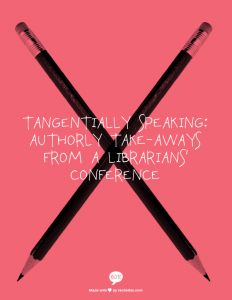Having just finished writing a novel, I’ve been thinking a lot about story ideas and what to write next, so a bit of advice offered in a blog post I was reading jumped out at me. It caught my attention partly because of its relevance to what I was thinking about at the time, but also because it appeared to be completely at odds with another bit of advice I’d read a few months prior that really resonated with me. This sent me digging through my Twitter Favorites until I found that other post I remembered reading, so I could re-read it and compare the two posts side by side.
Now I’m wondering what others think on the issue of choosing to “spend” or “save” your best story ideas. So please, check out these quotes and the links to the original articles, and then if you’re intrigued, come back here to discuss.

The more recent article is one advising new novelists not to worry if their earliest attempts don’t measure up to what they want to achieve. It makes some great points about having to write novels in order to learn how to write novels well, and makes the very reasonable assertion that your first attempt will probably not be as good as future attempts. Then it goes on to compare writing a novel to climbing a mountain or cutting a precious gem, and recommends waiting to tackle the really high mountain or the particularly valuable gem until your skills are equal to the task.
“If you’re not ready to write that really cool novel that’s pounding at you, demanding to be written, shelve it. Put it on the back burner. Pick your cliche, but set that story aside and begin with something simpler. Or just something that doesn’t matter as much. If you know that you’re not ready, that you don’t have the skills and insights, don’t try to write the story that you hope will compare favorably with your favorite author’s best work.” – Beth Hill’s “(Stop) Comparing Yourself to Successful Authors”
There are some great points in this blog post that I do agree with, and I’m sure there are some excellent reasons for shelving an idea to write later, but the concept of putting off writing an idea you love just because you’re not sure the result will live up to your expectations? That bothers me. I know I learned a lot over the course of writing my first (incomplete) novel that made my second (or first complete) novel significantly better. And I learned a lot over the course of writing and editing my first completed novel that allowed me to see my first attempt a lot more clearly. Someday (maybe next week or maybe in a few years) I’ll come back to edit and finish (or maybe completely rewrite?) that first attempt, because I do still love the premise. I picked that idea in the first place for that very reason, because I loved the idea, whether I was ready to realize it fully at the time or not, knowing that it could be edited or rewritten later if necessary.
And that’s where I think the analogy to mountain climbing or gem cutting breaks down. Writing a novel isn’t like climbing a mountain in that you could die or be irreparably injured in a failed attempt. And it’s not like cutting gems in that a poorly planned or executed cut could destroy rather than enhance the value in your raw material. Books can be edited. They can be rewritten. You can have as many second chances at that great idea as you want to take. Or come up with new and better ideas. But if you don’t try it and really give it your all, how can you know for sure what you’re capable of doing right now?
Which brings me to that competing bit of advice that struck a chord with me when I read it back in January, so much so that it stuck with me and came to mind when I read the more recent post.
“Don’t save your best storyline for later. Use it now. And what’s more, use the most intriguing characters you’ve ever come up with to people that tale. Keep a list of striking metaphors? Try and employ every single one of them in your current work in progress. Don’t skimp. Don’t save. Become a wanton spender of your creativity.” – Lisa Samson’s “Shoot the Wad”
Lisa Samson goes on to suggest, “If you live and love and take chances, if you open your eyes to the world not as you think it should be, but as it is, every single bit of it will soon be replaced.”
I hope she’s right about that, because for the book I just finished writing, I took her advice. I used what I considered my best romantic suspense story idea, one that had been percolating in the back of my brain for months (while working on that other novel), and I ran with it, holding nothing back.
So far, so good. I thoroughly enjoyed writing the story, and it got me through to the final stage in Harlequin’s Killer Voices contest and garnered a full manuscript request. No word yet on whether I’ll be getting a contract, a rejection, or a revision letter, but whatever happens next I’m glad I chose to focus on an idea I loved because I think it allowed me to write the best story I could at the time.
Now comes the scary part. No, I’m not talking about getting editorial feedback. I’m looking forward to that, strange as it may sound. I’m talking about coming up with another idea I love just as much for my next book. Which is where Lisa Samson’s advice is a huge source of encouragement. With thirty-four novels and three Christy Awards under her belt, her approach seems to have worked out well for her, and I’m hoping it’ll work well for me too.
I’m in the brainstorming phase right now. I’m busy bandying about possible villain motivations, hero and heroine characteristics, internal and external conflicts, scenes, settings, and more, looking for just the right mix of pieces that will fit together and complement each other to make a complete story idea I can really get excited about writing. Maybe (hopefully!) I’ll like it even better than my last one. 
Now I’m curious. What do you think? Is it better to “spend” or “save” your best story ideas? Or does it depend on the situation?

